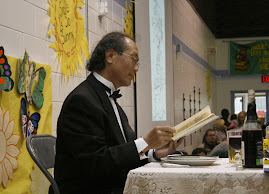I was at the Willow Creek's Leadership Summit yesterday and today. The messages from speaker after speaker rang loudly and impressed indelibly in my soul that the church today is out of sync, out of step, and out of tune with the changing world for whom it's supposed to serve. We tend to serve superficially and ritualistically, not Christ-like sacrificially.
Yes. That makes a world of difference! In other words, Christ's bride is not keeping time and step with her Bridegroom in the eternal waltz.
Particularly poignant was Tim Keller's treatise on how many of us who profess to be Christians have it all wrong. Many of us fail to focus on the cross when we apply biblical principles in living a Christian life. Keller draws a chasmic distinction between biblical thinking and Calvary living.
In his latest book, The Prodigal God, Keller, for the first time in my life, makes the parable clear for my own reflection and use.
Though "prodigal" means "wayward" when it was used to describe the younger son in the parable, it incidentally also means "recklessly extravagant". Thus, "prodigal" and "prodigious" are etymologically related words. The father in the parable is indeed a metaphor of that descriptive word, prodigal, recklessly extravagant in the way he welcomed and rejoiced in his son's return.
The father watched in the distance, as he did so everyday, saw a lone figure coming down the country road, rested assured that it was his son, ran to welcome him half way down the path, hugged and kissed him, wouldn't have time for his son's prepared apology, placed a fine robe over him, slipped a family ring on his finger, slaughtered the fatted calf, brought out the fine wine, and had a great celebrious party that said it all: "Welcome home, my son! Welcome home! I love you!"
There are three main characters in the parable: the father, the younger son who had turned prodigal (wayward), and the elder brother who dutifully ran the family farm.
Of course, the father is our Heavenly Father, and the elder brother represents many of us who are His church universal, and the prodigal son is the un-churched and wayward back-slid sinner that I am.
The father loved both sons equally well and lavishly. It broke his heart when the younger son did not love his Dad and did not bother to hide that fact. The younger son in effect told his father in his face that he had no love for him by his words and actions: "Give me my inheritance. I want to get away from you!"
Inheritance is passed on only when the parent dies, not while he lives. The prodigal son in essence is saying, "I wish you were dead!"
The elder brother was the "goodie-two-shoe" who dutifully did his father's bidding: "Yes, Dad. I know what to do. You can count on me. I won't disappoint you."
The elder brother was the religious crowd, the biblical Pharasees, scriptural teachers, and temple keepers. They did what they perceived as doing God's work, and they were proud of their dutiful good works. Even when they sinned and repented as instructed by the scriptures, they rejoiced that they had so quickly repented, and were proud of their ability to swiftly repent... particularly in public, as on street corners and on roof tops. They lived a life that is in keeping with scriptural principles.
But, do they love their Father more than their prodigal brothers? Not a chance! Their life is a ritualistic doing; not a deep humble surrender to and enjoyment of the Father's love. What's worse is that they are under the delusion that they love the Father by doing what He wants.
Why is that so?
Unless I go beyond living in accordance with biblical principles and become truly pained by looking at the cross on which God suffered and died for me, I would have never understood the extravagantly generous and self-sacrificial love God has lavished on me ... His running to meet me half-way, His hug and kisses, His return to me my membership and inheritance in His family, and the rejoicing in Heaven.
Why did the elder brother get so upset when he saw what his father was doing... welcoming his wayward brother home with an extravagant party?
As it turned out, though believing that he had filial love for his father by being a dutiful son, the elder brother did not truly love his father either. He just waited to get his share of the inheritance in due course. In the mean time, he did what he thought he was supposed to do. "This is Tuesday. It must be a day for weeding."
"This is Sabbath. It must be a day to turn our mind and heart to God."
"I find it hard to forgive her for stabbing me in the back."
"I am so cynical and bitter about how our government works. There is so much unfairness and injustices."
"I must offer my tithe because I do not want to steal from God, or cheat Him with what He deserves. He deserves one-tenth of what I have. The scriptures tell me so."
The above examples indicate my lack of understanding of what God has done for me. They are illustrations of biblical-thinking, but not Calvary-living.
Calvary-living compels me to sob uncontrollably at the empty cross of Jesus and understand the price He has paid for my renewed family membership. When I begin to understand the unfathomable price God paid for my sins to make me sinless, then what is 10% of my income in comparison to His all! In fact, what is material possession and even life itself if not to be used prodigiously for His Kingdom?
When I begin to appreciate the betrayal and injustices that God Himself had endured while on earth, who am I to nurture my bitter roots of critical spirit, resentment, judgement, unforgiveness, and a temptation to back-stab a few?
Both brothers wanted the same thing from their father... his money. The elder brother in effect said, "Dad, I have been such a faithful and hardworking servant to you. I deserve my inheritance."
"God. You owe me my salvation. As a matter of fact, I am my own saviour."
The prodigal son wanted his father's money as well. He turned wayward. He back-slid into a life of moral blackhole. How he fell (Not too differently than Lucifer in that regard)! But, at the bottom of the deep dark mucky well, at the end of his resources and himself, the prodigal son could only look up and saw light above. He knew that to survive, he must make all attempts to climb up.
To his big surprise, as soon as the prodigal extended his hand to make his first climbing motion, his Heaven Father extended His loving hand to pull him up out of the miry depth... in the same graphic depiction of how God the Father reaches out His hand and finger towards Adam who extended his hand and finger rather half-heartedly on the ceiling of the Sistine Chapel in St. Peter's Basilica.
God's love and salvation is a finger's breadth (a prayer) away!
Towards the end of this parable, the lost son truly ran back into his father's embrace; and he truly enjoyed the party thrown for him by his father.
The prodigal son said in effect, "I am a sinner. You do not owe me my salvation. YOU are my salvation!"
The object of living a Calvary-life is to appreciate the distance God has gone to save me so that I may enjoy His holy presence in His family again.
Too bad for the elder brother who sulked and refused to join the party. Instead, he spent time complaining how unfair his father was to HIM, the loyal son, the heir-apparent, and now, the (self-) dejected.
"Dad. How could you even think of spending prodigiously the portion of my inheritance for this wayward brother of mine? What gets into you?"
To whom did Jesus tell this parable?
Read the Gospel of Luke, chapter 15 and find out.
My rhetorical question is: "As a confessed follower of Christ, how do I live my faith? Live biblically and spiritually? Or, live everyday appreciating the price and victory of the cross?"
Living my faith the latter way is to awake from my spiritual deadness, as Jesus beckoned Lazarus at his tomb with: "Come forth and live!"
Friday, August 7, 2009
Subscribe to:
Post Comments (Atom)





1 comment:
Interesting definition of "prodigal." Because we use the word only in context of Jesus' story, we tend to interpret it according to the story--the prodigal did wrong so, being prodigal must be bad. I double checked the meaning (just because that's what I do) and found this definition: "a recklessly extravagant consumer." That's what had gotten the son in trouble--his reckless extravagance. Had he been prudent, he wouldn't have gotten himself into the trouble he found himself.
Yet this speaker calls God prodigal. God is certainly extravagant toward us but he is neither consumer nor reckless. All he does is with a purpose and rather than being consumer, he's the ultimate producer (as creator of all things).
We do forget that God is extravagantly generous, that is true. I think we take his generosity for granted and forget the extravagance of what he has done for us. Perhaps that is something we should meditate upon more.
Post a Comment